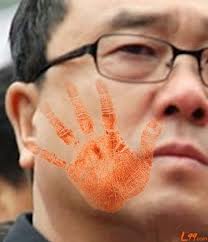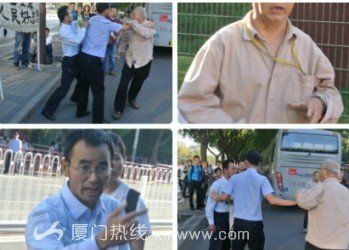“Slap on the face”的版本间的差异
来自China Digital Space
| 第3行: | 第3行: | ||
In 2012, there were two famous "slaps on the face." | In 2012, there were two famous "slaps on the face." | ||
| − | The first "slap on the face" was one of the pivotal moments leading to the downfall of [http://chinadigitaltimes.net/china/bo-xilai/ former Chongqing Party chief Bo Xilai], and was revealed during the [http://chinadigitaltimes.net/2012/09/details-of-the-trials-of-wang-lijun/ trial] of [http://chinadigitaltimes.net/china/wang-lijun/ fallen Chongqing police chief Wang Lijun], once Bo's right hand man. When Wang | + | The first "slap on the face" was one of the pivotal moments leading to the downfall of [http://chinadigitaltimes.net/china/bo-xilai/ former Chongqing Party chief and mayor Bo Xilai], and was revealed during the [http://chinadigitaltimes.net/2012/09/details-of-the-trials-of-wang-lijun/ trial] of [http://chinadigitaltimes.net/china/wang-lijun/ fallen Chongqing police chief Wang Lijun], once Bo's right hand man and deputy mayor. When Wang revealed to Bo that his wife [http://chinadigitaltimes.net/china/gu-kailai/ Gu Kailai] was a suspect in [http://chinadigitaltimes.net/china/neil-heywood/ slain British businessman Neil Heywood]'s case, Bo reportedly slapped Wang on the face in front of his subordinates. This slap was apparently the tipping point that caused [http://chinadigitaltimes.net/2012/02/high-profile-official-disappears-amid-defection-rumors/ Wang, fearing his safety, to flee the U.S. embassy in an ultimately unsuccessful bid for asylum]. Wang's flight drew Beijing's attention to the murder investigation and ultimately led to the ouster of Bo and his [http://chinadigitaltimes.net/2013/08/bo-xilai-trial-liveblog/ ongoing corruption trial], and the [http://chinadigitaltimes.net/2012/08/gu-kailai-found-guilty-of-heywood-killing/ conviction of his wife]. |
| − | Netizens | + | The slap inspired visual Internet memes, and sparked rampant netizen commentary. Netizens dubbed the incident, which set forth a series of events shaking the highest levels of China's leadership, [http://www.tealeafnation.com/2012/09/the-slap-heard-round-the-world-and-the-netizen-innovation-that-followed/ "the slap heard round the world"]. One quipped, "The system couldn't change things, the people couldn't change things -- the only thing that changed things was a slap on the face." |
| − | [[File:Wang lijun.jpg]] | + | [[File:Wang lijun.jpg|300px|thumb|right''A meme showing Wang with a handprint on his face spread widely following his trial'']] |
The other "slap on the face" in 2012 refers to an event during the anti-Japanese protests over Japan's claim to the Diaoyu Islands. During the protests, a pro-Mao faction emerged calling slogans such as, "We miss you, Chairman Mao." An elderly man stepped forward and said, "It doesn't make sense to place our hopes for our country's dignity and nationalism on Mao Zedong." Thereupon, well-known Mao-sympathizer, Han Deqiang (an associate professor at Beihang University) walked over and slapped the elderly man twice. Even after the photograph of Han slapping the elderly man circulated on the internet, Han remained unrepentant, stating that the man was talking nonsense and deserved to be hit. | The other "slap on the face" in 2012 refers to an event during the anti-Japanese protests over Japan's claim to the Diaoyu Islands. During the protests, a pro-Mao faction emerged calling slogans such as, "We miss you, Chairman Mao." An elderly man stepped forward and said, "It doesn't make sense to place our hopes for our country's dignity and nationalism on Mao Zedong." Thereupon, well-known Mao-sympathizer, Han Deqiang (an associate professor at Beihang University) walked over and slapped the elderly man twice. Even after the photograph of Han slapping the elderly man circulated on the internet, Han remained unrepentant, stating that the man was talking nonsense and deserved to be hit. | ||
[[File:Handeqiang.jpg]] | [[File:Handeqiang.jpg]] | ||
2013年8月27日 (二) 20:22的版本
耳光 (ěr guāng): slap on the face
In 2012, there were two famous "slaps on the face."
The first "slap on the face" was one of the pivotal moments leading to the downfall of former Chongqing Party chief and mayor Bo Xilai, and was revealed during the trial of fallen Chongqing police chief Wang Lijun, once Bo's right hand man and deputy mayor. When Wang revealed to Bo that his wife Gu Kailai was a suspect in slain British businessman Neil Heywood's case, Bo reportedly slapped Wang on the face in front of his subordinates. This slap was apparently the tipping point that caused Wang, fearing his safety, to flee the U.S. embassy in an ultimately unsuccessful bid for asylum. Wang's flight drew Beijing's attention to the murder investigation and ultimately led to the ouster of Bo and his ongoing corruption trial, and the conviction of his wife.
The slap inspired visual Internet memes, and sparked rampant netizen commentary. Netizens dubbed the incident, which set forth a series of events shaking the highest levels of China's leadership, "the slap heard round the world". One quipped, "The system couldn't change things, the people couldn't change things -- the only thing that changed things was a slap on the face."
The other "slap on the face" in 2012 refers to an event during the anti-Japanese protests over Japan's claim to the Diaoyu Islands. During the protests, a pro-Mao faction emerged calling slogans such as, "We miss you, Chairman Mao." An elderly man stepped forward and said, "It doesn't make sense to place our hopes for our country's dignity and nationalism on Mao Zedong." Thereupon, well-known Mao-sympathizer, Han Deqiang (an associate professor at Beihang University) walked over and slapped the elderly man twice. Even after the photograph of Han slapping the elderly man circulated on the internet, Han remained unrepentant, stating that the man was talking nonsense and deserved to be hit.






